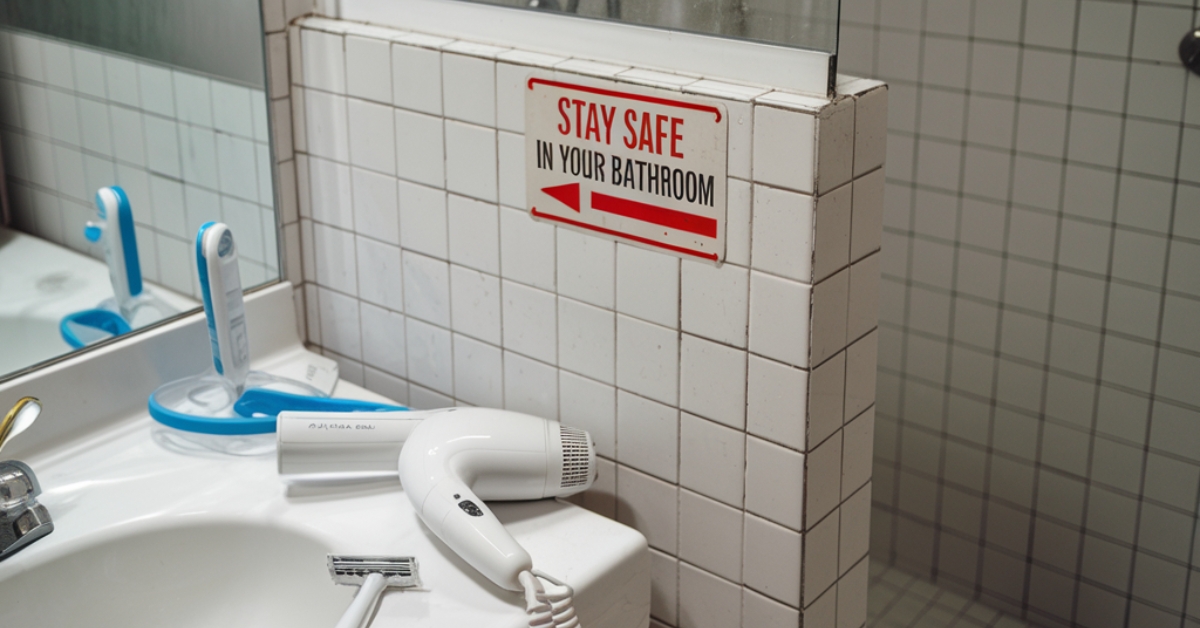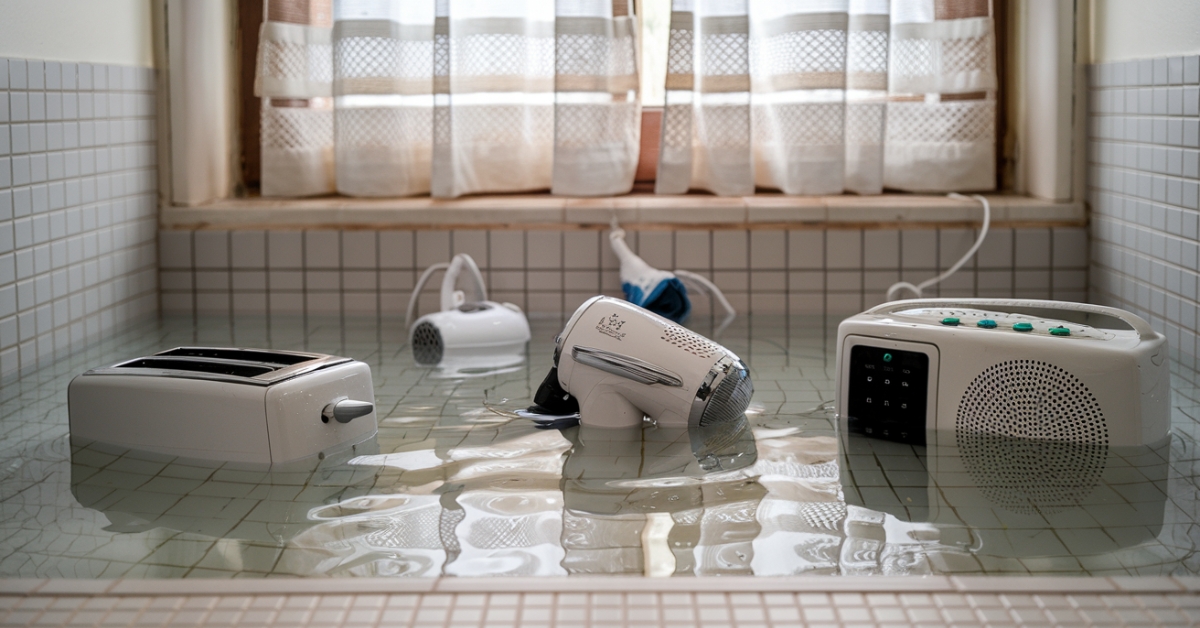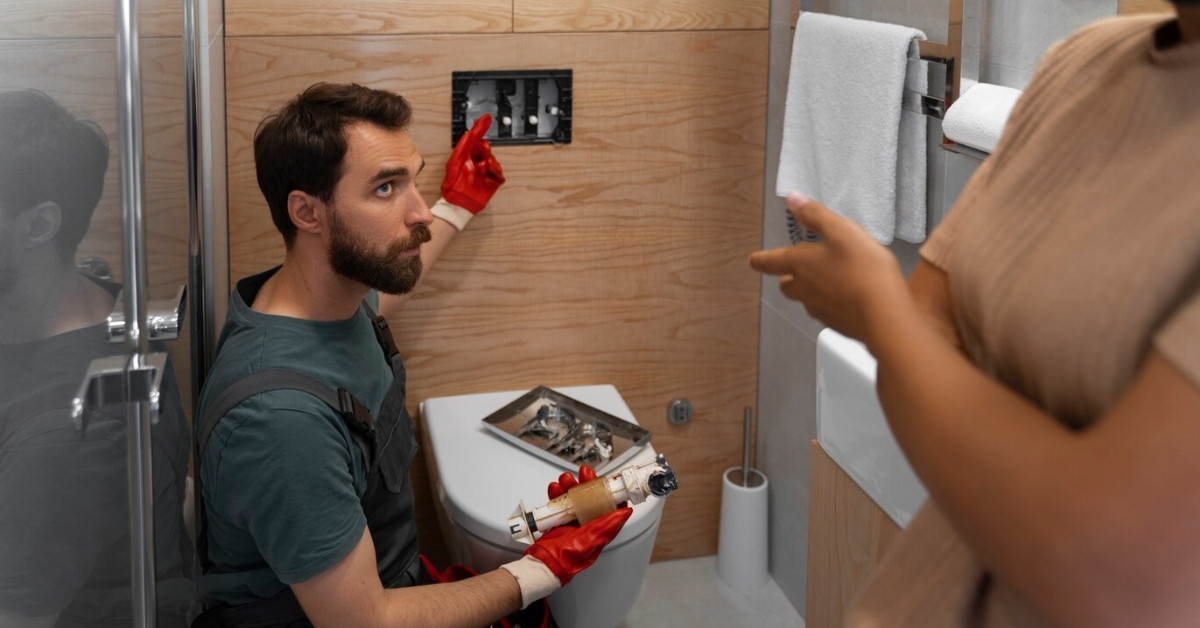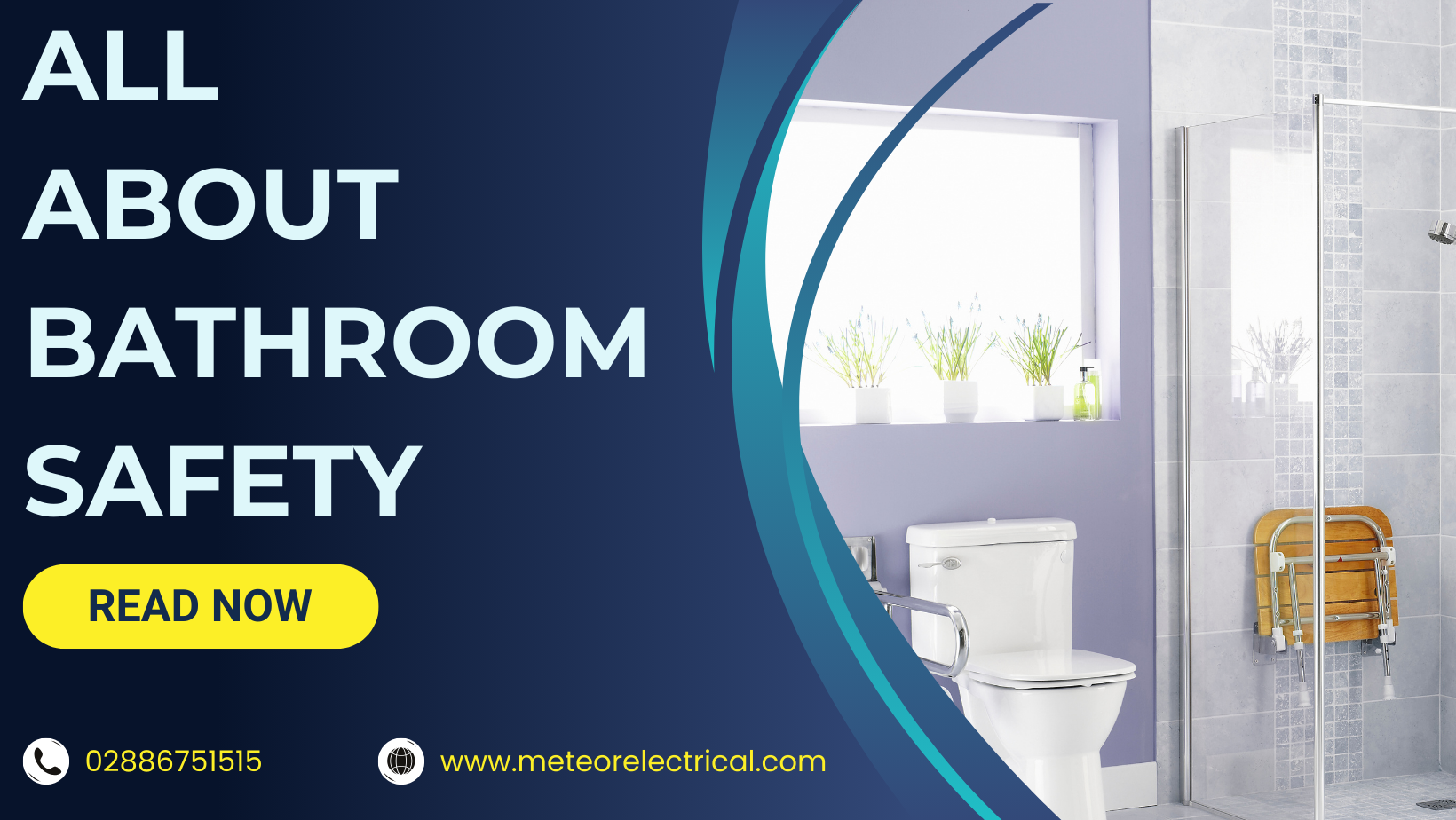Bathroom Safety

When it comes to electrical safety at home, the bathroom tops the list of high-risk areas. Water and electricity are a dangerous combination, and an electric shock in a wet environment can have severe, even deadly consequences. That's why special attention is needed for electrical installations in bathrooms, adhering to Part P of the Building Regulations. To ensure your safety, it's crucial to hire a certified electrician registered with a government-approved scheme like Meteor Electrical to handle any electrical work in your home. Proper electrical safety not only protects you and your family but also ensures compliance with Health and Safety Executive (HSE) guidelines.
Credit: ElectricalSafetyESA
Sockets
- Placement Restrictions: Sockets are generally prohibited in bathrooms and shower rooms, except for shaver-supply units. These units must be installed at least three meters away from the bath or shower to minimize the risk of electric shocks.
- Shaver-Supply Safety: Ensure that electrical shaver points are positioned safely to prevent water splashes from reaching them.
Lights
- Preferred Fixtures: Opt for enclosed ceiling lights over hanging ones to reduce the risk of electrical accidents.
- Safe Installation: Any light fittings that are not enclosed should be installed out of reach of someone using or still wet from a bath or shower.
- Switch Safety: Traditional wall switches can be hazardous due to dampness and wet hands. A ceiling-mounted pull-cord switch is the safest alternative, minimizing the risk of accidental shocks.
Heaters and Towel Rails
- Central Heating: The safest method to keep your bathroom warm is through central heating systems.
- Safe Placement: If you opt for an electric heater, it must be installed at a safe distance from the bath or shower. Both electric and gas water heaters should be fixed and permanently wired unless they are connected via a socket positioned three meters away from the bath or shower.
- Control Accessibility: Using a pull-cord or an external switch outside the bathroom is the ideal way to control electric heaters, ensuring you can operate them safely without entering a wet environment.
Portable Electrical Appliances

- Avoid Usage: Never bring mains-powered portable appliances such as hairdryers, heaters, or radios into the bathroom. The combination of water and electricity can lead to severe injury or even fatality.
For more comprehensive information on electrical safety in your home, visit the Electrical Safety First website.
Bathroom Electrical Safety Checklist

Ensure your bathroom remains a safe space by following this comprehensive electrical safety checklist. Use it to verify that all installations meet safety standards and reduce the risk of electrical hazards.
| Safety Aspect | Recommended Actions | Meteor Electrical Services |
|---|---|---|
| Certified Electrician | Hire a certified electrician registered with a government-approved scheme. | Our certified electricians ensure compliance with all safety regulations. |
| Proper Socket Placement | Install shaver-supply units at least three meters away from bath or shower. | We safely install and position electrical sockets as per regulations. |
| Safe Lighting Fixtures | Use enclosed ceiling lights and install non-enclosed fixtures out of reach. | We offer a range of safe lighting solutions tailored for bathrooms. |
| Appropriate Heating | Install central heating or ensure electric heaters are a safe distance from water. | Meteor Electrical helps you choose and install safe heating options. |
| Pull-Cord Switches | Use ceiling-mounted pull-cord switches instead of wall switches. | We can install pull-cord switches for safer operation in wet environments. |
| Avoid Portable Appliances | Do not use mains-powered portable devices like hairdryers or heaters in the bathroom. | We advise on safe usage and alternative solutions for your bathroom needs. |
| Regular Inspections | Conduct regular electrical safety inspections to ensure compliance and safety. | Our team provides thorough inspections to maintain your bathroom’s safety. |
| Waterproof Equipment | Use waterproof and Class II equipment in high moisture zones. | We supply and install only high-quality, waterproof electrical fixtures. |
How to Use This Checklist

- Certified Electrician: Always start by hiring a certified professional. This ensures that all electrical work meets the required safety standards and regulations.
- Proper Socket Placement: Verify that all electrical sockets, especially shaver points, are installed at a safe distance from water sources to prevent electric shocks.
- Safe Lighting Fixtures: Choose appropriate lighting fixtures that minimize the risk of electrical accidents. Enclosed ceiling lights are preferable in wet areas.
- Appropriate Heating: Opt for central heating or ensure that any electric heaters are installed safely away from water sources to avoid overheating and electrical hazards.
- Pull-Cord Switches: Replace traditional wall switches with ceiling-mounted pull-cord switches to reduce the risk of electric shocks when hands are wet.
- Avoid Portable Appliances: Educate household members about the dangers of using portable electrical devices in the bathroom to prevent accidents.
- Regular Inspections: Schedule regular electrical safety inspections to identify and address potential hazards before they become serious issues.
- Waterproof Equipment: Ensure that all electrical equipment used in the bathroom is waterproof and rated for high-moisture environments to maintain safety.
By following this checklist, you can enhance the safety of your bathroom's electrical systems and create a secure environment for you and your family. For professional assistance and to ensure all safety measures are properly implemented, trust the experts at Meteor Electrical. Our dedicated team is committed to providing top-notch electrical services that prioritize your safety and compliance with all regulations.
Conclusion
Your bathroom should be a sanctuary of relaxation, not a source of electrical hazards. By following these essential safety tips, you can significantly reduce the risk of accidents and ensure that your bathroom remains a safe space for you and your loved ones. When it comes to electrical installations and maintenance, trust the experts at Meteor Electrical. Our certified electricians are committed to providing top-notch services that comply with all safety regulations, giving you peace of mind. Don’t compromise on safety—contact Meteor Electrical today to ensure your bathroom’s electrical systems are both safe and reliable.
Stay safe and ensure your bathroom's electrical installations are up to code with Meteor Electrical's expert services. Your safety is our priority!
FAQs
1. Why is the bathroom considered the most hazardous room for electrical safety?
Bathrooms are high-risk areas because water and electricity are often present together. Wet conditions can significantly increase the risk of electric shocks, making proper safety measures essential to prevent accidents.
2. Do I need a certified electrician to handle electrical work in my bathroom?
Yes, it is crucial to hire a certified electrician for any electrical work in your bathroom. Certified professionals, like those at Meteor Electrical, ensure that installations comply with Part P of the Building Regulations and adhere to all safety standards.
3. Are regular power sockets allowed in bathrooms?
Regular power sockets are generally prohibited in bathrooms. Only shaver-supply units are permitted, and they must be installed at least three meters away from any bath or shower to minimize the risk of electric shocks.
4. What types of lighting are safest to use in a bathroom?
Enclosed ceiling lights are the safest option for bathrooms as they reduce the risk of electrical accidents. If using non-enclosed fittings, ensure they are installed out of reach of anyone using or still wet from a bath or shower. Additionally, ceiling-mounted pull-cord switches are recommended to avoid the dangers of traditional wall switches in damp environments.
5. Is it safe to use portable electrical appliances like hairdryers or heaters in the bathroom?
No, it is unsafe to use mains-powered portable appliances such as hairdryers, heaters, or radios in the bathroom. The combination of water and electricity can lead to severe injuries or even fatalities. Always use electrical devices as per the manufacturer's guidelines and avoid using them in wet areas.

